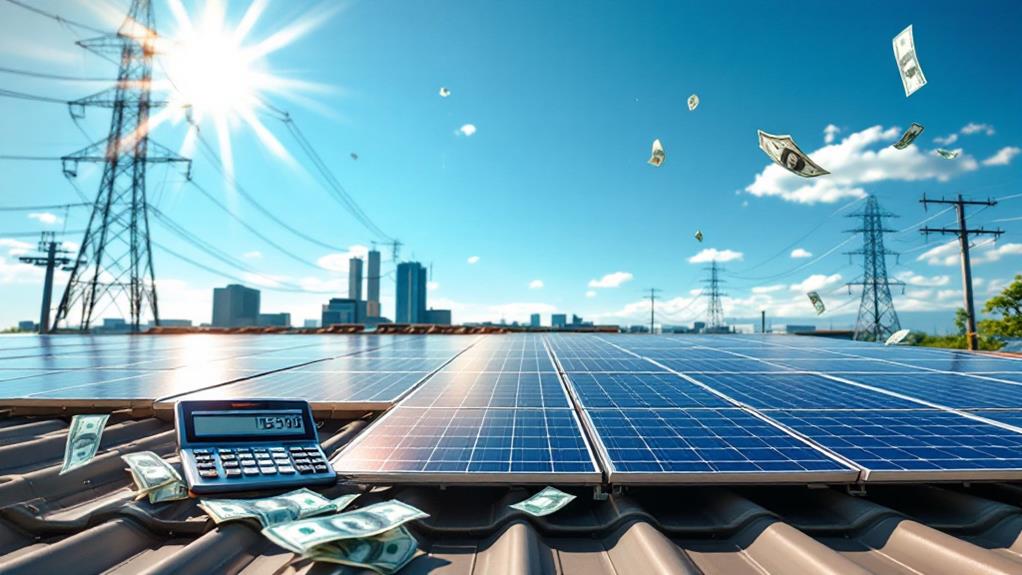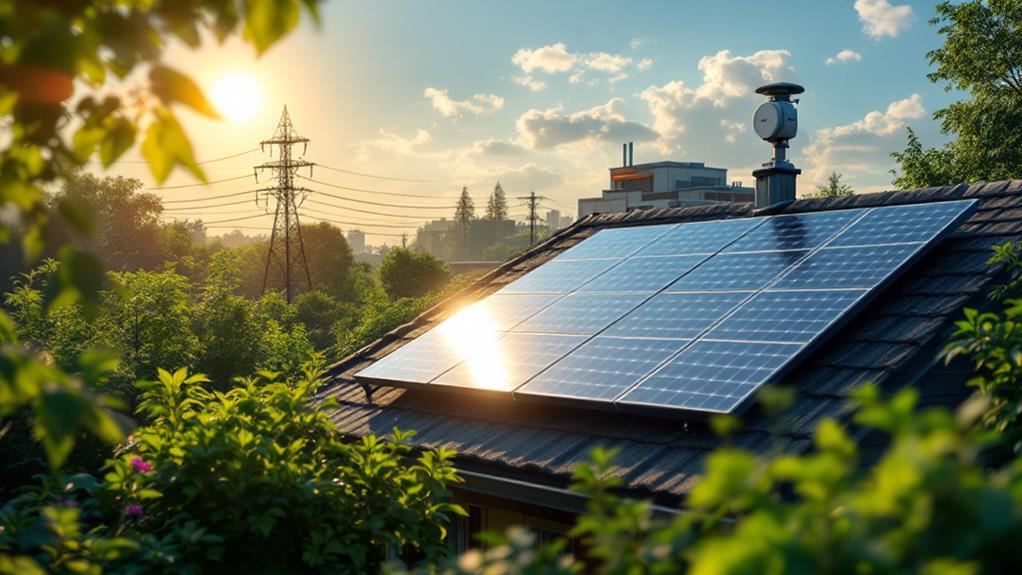Can You Sell Your Solar Power to the Electric Company? A Guide to Solar Energy

Yes, you can sell your solar power to the electric company, primarily through net metering. This system allows you to feed excess energy generated by your solar panels back into the grid, earning credits on your utility bill. You gain financial incentives, reduce your reliance on traditional energy sources, and contribute to a sustainable environment. However, selling solar power comes with regulatory considerations, requiring you to navigate state-specific regulations and secure appropriate permits. By understanding utility contracts and maximizing your solar profitability, you can capitalize on these opportunities and uncover more about optimizing your solar energy experience.
Understanding Solar Power Systems
Grasping the basics of solar power systems is crucial if you want to capitalize on selling solar energy back to the electric company. Initially, you need to understand the different solar panel types available. Monocrystalline panels are known for their high efficiency and sleek appearance, while polycrystalline panels are generally more affordable, albeit slightly less efficient. Thin-film panels, although less common for residential use, can be a flexible option for unique installations.
Equally significant is choosing the right solar inverter options. Inverters convert the direct current (DC) produced by your solar panels into alternating current (AC), which your home and the grid use. You'll find three primary inverter types: string inverters, microinverters, and power optimizers. String inverters are the most cost-effective and work well for consistent sunlight conditions. Microinverters, installed on each panel, offer improved efficiency and are ideal if your panels face different directions or experience shading. Power optimizers combine elements of both, maximizing panel output while centralizing conversion.
Net Metering Explained
Net metering is a billing mechanism that can greatly improve the value of your solar power system. Understanding net metering basics is essential if you're considering solar energy. It allows you to feed excess electricity generated by your solar panels back into the grid. When your system produces more electricity than your home uses, your utility company credits your account. This process can considerably reduce your energy bills and optimize the return on your solar investment.
Let's break down the net metering advantages:
- Cost Savings: You can lower your monthly electricity bills by using the credits earned from the excess energy you generate.
- Energy Independence: Net metering reduces your reliance on the grid, giving you more control over your energy usage and costs.
- Environmental Impact: By feeding clean energy back into the grid, you help reduce total greenhouse gas emissions.
- Increased System Value: Net metering improves the financial viability of installing solar panels, increasing the system's long-term value.
Benefits of Selling Solar Power

Beyond simply using solar energy at home, selling your surplus solar power back to the electric company offers numerous advantages. Initially, you can benefit financially through solar incentives that reward you for contributing to the grid. These incentives, such as net metering credits, can greatly reduce your utility bills, making solar energy an even more attractive investment.
Moreover, selling your solar power promotes energy independence. By generating your own electricity and selling the excess, you're less reliant on traditional power sources. This move not only bolsters your household's autonomy but also strengthens grid stability by providing a steady supply of renewable resources.
Environmental impact is another compelling reason to sell solar power. By feeding clean energy into the grid, you're helping to reduce the community's carbon footprint, contributing to a healthier planet. This action aligns perfectly with the broader shift toward sustainable living and supports the change away from fossil fuels.
Legal and Regulatory Considerations
Navigating through the legal and regulatory landscape is vital when you decide to sell solar power back to the electric company. Every state has its own set of rules, and understanding these is important for a smooth setup. Initially, get familiar with the interconnection standards in your area. These standards dictate how your solar system connects to the grid, guaranteeing safety and efficiency.
Next, explore the specific state regulations that govern solar energy. Each state may have different requirements for selling back power, including compensation rates and eligibility. Often, these regulations are designed to encourage solar adoption, but staying updated is key as these laws can change.
Here's a quick checklist to guide you:
- Research local interconnection standards: Understand what's required to safely connect your solar system to the grid.
- Check state regulations: Know what your state allows and any incentives available for selling solar power.
- Obtain necessary permits: Make sure you have all required permits and approvals to avoid legal hurdles.
- Consult with a professional: Consider seeking advice from a solar energy consultant to navigate these complexities.
Calculating Potential Earnings

Understanding the potential earnings from selling solar power involves a few key calculations. Initially, you'll want to determine how much excess energy your solar panels produce, which you can sell back to the electric company. This involves evaluating your household's energy consumption against the total energy your solar system generates. Once you know the surplus energy, you can investigate the solar energy markets to understand the current rates for selling this power.
Next, consider if your utility company offers a power purchase agreement (PPA). With a PPA, the electric company agrees to buy your excess solar power at a predetermined rate, usually over a long-term period. These agreements can provide a steady income stream, but it's essential to compare rates and terms with current market offers to guarantee you're getting the best deal.
Also, keep in mind any incentives or rebates that might improve your earnings. Some regions offer financial incentives for solar energy production, which can increase your total profit. By carefully calculating and comparing these elements, you can optimize your potential earnings from solar power sales, making your investment in solar energy more lucrative.
Setting Up Your System
After calculating your potential earnings from selling solar power, the next step is setting up your system efficiently. Proper setup guarantees maximum energy production and smooth integration with the grid. Start with a well-planned solar panel installation that optimizes sunlight exposure. Consider roof orientation and angle to capture the most sunlight throughout the year. Use these steps to guide your setup:
- Evaluate Your Roof Space: Before installing panels, assess your roof's condition, size, and orientation. Confirm it's structurally sound and has enough space for the number of panels you need.
- Choose Quality Panels: Opt for high-efficiency solar panels that suit your budget. Quality panels can greatly impact your total energy generation and return on investment.
- Inverter Selection: Pick an inverter that matches your system's capacity. The inverter converts the DC electricity from your panels into AC electricity for use in your home and for selling back to the grid.
- Hire a Professional: While DIY might seem tempting, hiring a certified installer guarantees compliance with local regulations and safety standards.
Choosing the Right Utility Contract

Selecting the right utility contract is crucial for maximizing your profits from selling solar power. You'll want to examine utility rates closely, as they can vary greatly between companies. Understanding these rates helps you evaluate how much you'll earn for the energy you sell back to the grid. Pay attention to contract terms, which detail the length of the agreement and any potential penalties for early termination.
Energy credits play an important role in how your solar energy is compensated. Make sure you understand how these credits accumulate and are applied to your bill. Some regions offer solar incentives that can improve the financial benefits of your renewable energy system. Be sure to research any available programs that might apply to you.
Consider if your utility offers community solar programs, which can provide extra avenues for selling your power. A power purchase agreement (PPA) might be an option if your utility prefers purchasing energy at a set rate. Finally, interconnection agreements outline how your solar system connects to the grid, ensuring smooth and efficient energy transfer. Steering through these factors will help you secure a contract that aligns with your energy goals.
Maximizing Solar Profitability
To improve solar profitability, it's essential to utilize the insights gained from selecting the right utility contract. This choice can greatly impact your financial returns. But optimizing profit isn't just about choosing a contract; you should consider different strategies to increase your earnings from solar power. Here's how you can maximize profitability:
- Leverage Solar Incentives: Take advantage of federal, state, and local solar incentives. These can include tax credits, rebates, and grants that reduce installation costs and raise your return on investment. Always stay informed about new incentives that might become available.
- Invest in Energy Storage: Adding a battery storage system allows you to store excess energy generated during peak sunlight hours. You can use this stored energy during peak demand times when electricity rates are higher, thereby maximizing savings and profit.
- Conduct Regular Maintenance: Keep your solar panels clean and well-maintained to guarantee they're operating at optimal efficiency. Dirty or damaged panels can lead to reduced energy production and lower profitability.
- Monitor and Adjust Usage: Utilize smart home technology to monitor your energy usage. Adjust your consumption patterns to make sure you're using solar power effectively, especially during peak generation times.



